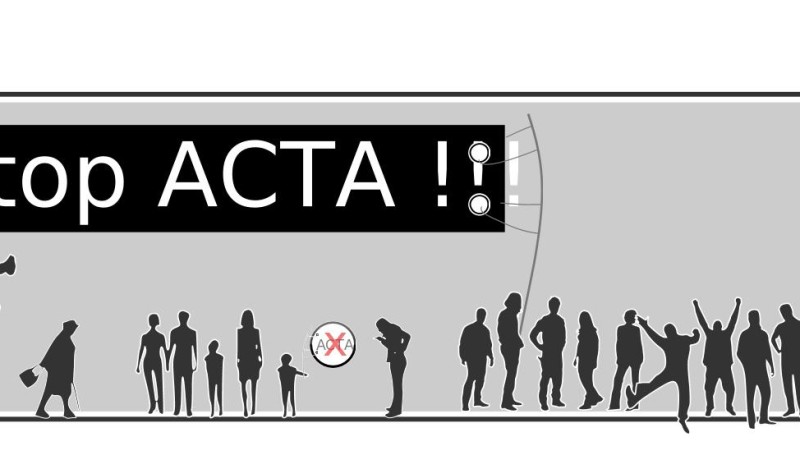Three More Nails In ACTA’s Coffin
May 31, 2012
on
on

Today the first of a series of votes on ACTA –The Anti-Counterfeiting Trade Agreement- took place in the European Parliament. Three committees were scheduled to give their voting recommendation and all three advised to reject the treaty.
On July 2 the European Parliament is expected to take the final vote on whether to accept or reject ACTA. If rejected the European Union will not ratify the treaty and will not come into force.
A slow and complicated process leads up to that final decision. The INTA committee (International Trade) will give the Parliament a formal recommendation on whether to vote yay or nay . But before that four other committees will give their recommendations to the INTA committee. Three of them voted today.
In the ITRE committee (Industry, Research and Energy) a majority voted in favor of Pirate Party representative Amelia Andersdotter’s advise to reject ACTA.
In the LIBE committee (Civil Liberties) an overwhelming 36 members voted against recommending ACTA while only one was in favor, 21 members abstained.
Most surprising was the negative advise of the JURI Committee (Legal affairs) which is generally pro-copyright laws. A pro-ACTA advise drafted by Marielle Gallo (European People’s Party) was rejected by a small margin 12 to 10.
The outcome is a victory for opponents of the anti-piracy agreement. In February thousands took to the streets all across Europe to demonstrate against it. Their main concerns being that the treaty threatens free speech and the privacy of citizens. It would also prevent participating countries from reforming current copyright laws that many consider to be out-of-date already.
Proponents argue that intellectual property needs to be protected in a global framework since national laws do not suffice anymore in an increasingly interconnected world.
The next round of voting will go to the DEVE Committee (Development). They too will vote to advise the INTA committee.
On June 20-21 the INTA committee will take these recommendations in consideration and cast their own vote. Appointed rapporteur on ACTA for that committee David Martin (Socialists and Democrats) is strongly opposing the treaty. In April he said: ‘The intended benefits of this international agreement are far outweighed by the potential threats to civil liberties.’
On July 2, the European Parliament will cast its final vote. If ACTA is accepted this doesn’t mean it will be ratified for certain. All individual member states of the union will have to give their backing. Germany and Poland are reluctant. And in The Netherlands the Parliament unanimously accepted a motion not to sign ACTA.
If the European Parliament rejects ACTA, it will be scrapped for good. In the EU that is. What this would mean for the fate of ACTA in other countries who have signed (but not ratified) the treaty is not clear at this point. These countries include The United States, New Zealand, Canada, Japan, Australia, Canada, Morocco, South Korea and Singapore.
Art by Ingis: Openclipart.org
On July 2 the European Parliament is expected to take the final vote on whether to accept or reject ACTA. If rejected the European Union will not ratify the treaty and will not come into force.
A slow and complicated process leads up to that final decision. The INTA committee (International Trade) will give the Parliament a formal recommendation on whether to vote yay or nay . But before that four other committees will give their recommendations to the INTA committee. Three of them voted today.
In the ITRE committee (Industry, Research and Energy) a majority voted in favor of Pirate Party representative Amelia Andersdotter’s advise to reject ACTA.
In the LIBE committee (Civil Liberties) an overwhelming 36 members voted against recommending ACTA while only one was in favor, 21 members abstained.
Most surprising was the negative advise of the JURI Committee (Legal affairs) which is generally pro-copyright laws. A pro-ACTA advise drafted by Marielle Gallo (European People’s Party) was rejected by a small margin 12 to 10.
The outcome is a victory for opponents of the anti-piracy agreement. In February thousands took to the streets all across Europe to demonstrate against it. Their main concerns being that the treaty threatens free speech and the privacy of citizens. It would also prevent participating countries from reforming current copyright laws that many consider to be out-of-date already.
Proponents argue that intellectual property needs to be protected in a global framework since national laws do not suffice anymore in an increasingly interconnected world.
The next round of voting will go to the DEVE Committee (Development). They too will vote to advise the INTA committee.
On June 20-21 the INTA committee will take these recommendations in consideration and cast their own vote. Appointed rapporteur on ACTA for that committee David Martin (Socialists and Democrats) is strongly opposing the treaty. In April he said: ‘The intended benefits of this international agreement are far outweighed by the potential threats to civil liberties.’
On July 2, the European Parliament will cast its final vote. If ACTA is accepted this doesn’t mean it will be ratified for certain. All individual member states of the union will have to give their backing. Germany and Poland are reluctant. And in The Netherlands the Parliament unanimously accepted a motion not to sign ACTA.
If the European Parliament rejects ACTA, it will be scrapped for good. In the EU that is. What this would mean for the fate of ACTA in other countries who have signed (but not ratified) the treaty is not clear at this point. These countries include The United States, New Zealand, Canada, Japan, Australia, Canada, Morocco, South Korea and Singapore.
Art by Ingis: Openclipart.org
Read full article
Hide full article


Discussion (0 comments)